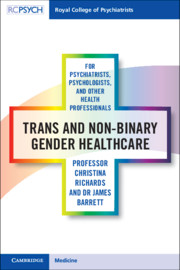Book contents
- Trans and Non-binary Gender Healthcare for Psychiatrists, Psychologists, and Other Health Professionals
- Reviews
- Trans and Non-binary Gender Healthcare for Psychiatrists, Psychologists, and Other Health Professionals
- Copyright page
- Contents
- Acknowledgements
- Author Biographies
- Chapter 1 Introduction to Gender Diversity
- Chapter 2 Assessment
- Chapter 3 Physical Treatments for Trans People and Their Interactions with Psychiatric Treatments
- Chapter 4 Mental Health Conditions
- Chapter 5 Supporting Trans and Non-binary People in Mental Health Services
- Chapter 6 Supporting Trans and Non-binary People in Forensic Settings
- Chapter 7 Autistic Spectrum Conditions and Intellectual Disability
- Chapter 8 Sexuality, Relationships, and Reproduction
- Chapter 9 Legal and Religious Aspects
- Chapter 10 Psychotherapy
- Index
- References
Chapter 10 - Psychotherapy
Published online by Cambridge University Press: 18 August 2020
- Trans and Non-binary Gender Healthcare for Psychiatrists, Psychologists, and Other Health Professionals
- Reviews
- Trans and Non-binary Gender Healthcare for Psychiatrists, Psychologists, and Other Health Professionals
- Copyright page
- Contents
- Acknowledgements
- Author Biographies
- Chapter 1 Introduction to Gender Diversity
- Chapter 2 Assessment
- Chapter 3 Physical Treatments for Trans People and Their Interactions with Psychiatric Treatments
- Chapter 4 Mental Health Conditions
- Chapter 5 Supporting Trans and Non-binary People in Mental Health Services
- Chapter 6 Supporting Trans and Non-binary People in Forensic Settings
- Chapter 7 Autistic Spectrum Conditions and Intellectual Disability
- Chapter 8 Sexuality, Relationships, and Reproduction
- Chapter 9 Legal and Religious Aspects
- Chapter 10 Psychotherapy
- Index
- References
Summary
Psychotherapy with gender diverse people will proceed much as with cisgender people and for the same range of issues – be it bereavement, job issues, childhood trauma, relationship issues, mood disorders, psychosis, personality difficulties, and so on – although with the usual mannered inflection1 one would expect for any form of diversity. The usual principles of establishing good rapport and then utilising the appropriate modality with the client to address the presenting issue as well as any intersecting issues will apply. Naturally this will be the case whether one is a psychiatrist undertaking psychotherapy, a medical psychotherapist, a counselling psychologist, a clinical psychologist, or a psychotherapist. Given most readers will be entirely competent with such things, we will not needlessly detain ourselves here with a recap, but instead will move directly to a consideration of those matters which arise in psychotherapy which directly pertain to gender diverse people, before considering how gender diversity might be approached from the position of the more common psychotherapeutic modalities.
- Type
- Chapter
- Information
- Trans and Non-binary Gender Healthcare for Psychiatrists, Psychologists, and Other Health Professionals , pp. 106 - 116Publisher: Cambridge University PressPrint publication year: 2020

